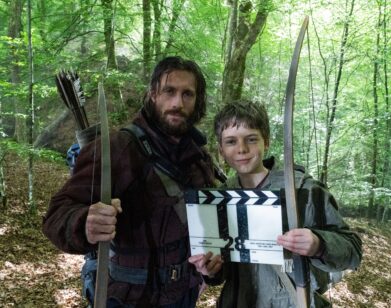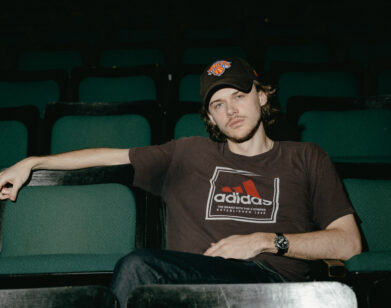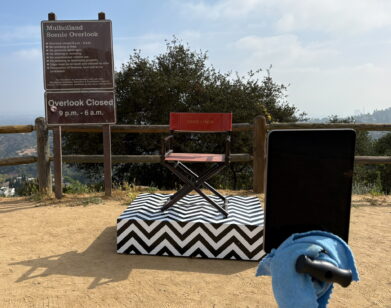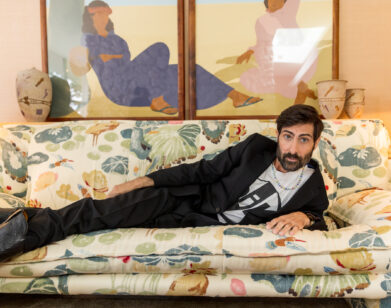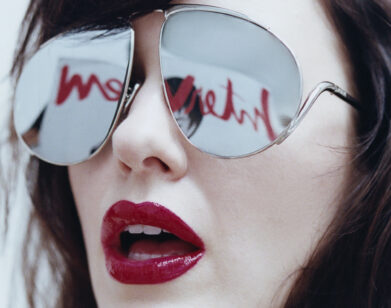Steph Green and Will Forteâ??s Big Jump
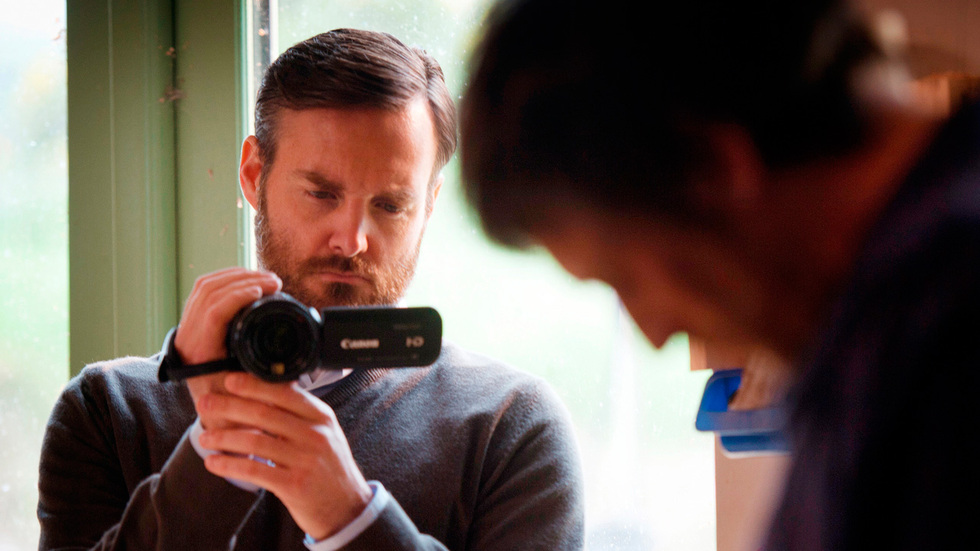
ABOVE: WILL FORTE IN RUN & JUMP
With her first feature Run & Jump, Steph Green, the Oscar-nominated director of the short New Boy, says she aimed to create a certain “domestic intimacy”—a subtle, yet comprehensive look at the happenings of daily life, routine, and its eventual disruption. The script, which Green wrote along with Ailbhe Keogan and finessed at the Sundance Institute’s Screenwriters Lab and the Berlinale Script Station, relays an intimate, melancholic yet hopeful story of a once tight-knit family now adrift, and how they work to keep things together.
Green worked to select a cast of strong performers who could bring the small story to life with detail, and decided on Brit actress Maxine Peake as the tirelessly optimistic Irish matriarch Vanetia. Along with her two children, Vanetia welcomes home her husband Conor (Edward MacLiam) after recuperating from a stroke, which has severely altered his personality. Amidst this upheaval, Vanetia must also add another member to her clan, Dr. Ted Fielding (SNL and 30 Rock funnyman Will Forte), an American neuropsychologist assigned to report on Conor’s evolving condition, and whose research grant will benefit the family financially. Ted marks Forte’s first dramatic role (he decamped to Ireland for the five week shoot before starting on Alexander Payne’s Nebraska) and he embodies the character with a cold stoicism that begins to crack open, with help from Vanetia. As the bond that develops between the two evolves into a warm friendship and borderline romance, the family dynamics, including Ted and Conor’s roles in the household, are brought into contention.
Interview recently spoke to Green and Forte in New York.
COLLEEN KELSEY: Steph, why did you decide that this film was going to be your first full-length feature?
STEPH GREEN: I was looking for something where I could really direct performance. That’s where I feel I wanted to prove my chops as a director. And also, realistically, in your first feature, you’re not going to be able to have your 10 helicopter shots—unless you start making [Forte’s 2010 film] MacGruber.
WILL FORTE: You could have said it. “That’s what my forte is. That’s what my forte is.” You could have said it. Come on, there’s a mike here.
GREEN: Not with you in the room.
[Forte laughs]
GREEN: I love casting, so I wanted to do something where I could exercise that muscle. And so when the script came my way from my producer Tamara Anghie, she thought, and I thought as well, this is a beautiful ensemble piece with a complex and also a unique perspective. I had not seen anything like this, a really idiosyncratic script with truthful relationships and dialogue. Just one step back before that is the original writer. Her father suffered a brain injury. So she had this real-life experience of being in a family that coped with that kind of change. I had this person who had really been through similar emotional experiences.
KELSEY: When you were working on that, did you have the cast in mind?
GREEN: As soon as we identified the outside character would be American and would come to visit from America, I started looking at actors. And I looked at long lists of actors from agencies, and I just got a bee in my bonnet about using Will. And I really didn’t shut up about it. And eventually, everybody got behind me. Now I seem like the genius who plucked you out. Clearly, I was not crazy to think that Will could do this kind of work—he does it so brilliantly.
KELSEY: So many people want to talk about Will breaking out in a drama with Nebraska, obviously, but you shot this film first.
FORTE: Yeah, this was several months before that.
GREEN: A year.
FORTE: Yeah, a year before that. I still don’t know why she came to me. I mean, I could go back and go, “Oh, what an awesome experience to have had.” But back then, I didn’t even know if I could do this kind of thing. So for her to have that kind of confidence in me was just amazing. I was really nervous coming in.
GREEN: We were both nervous.
FORTE: I certainly didn’t have the confidence in me that she did. She won me over and got me confident.
KELSEY: Will, did you accept right away, or did you have to ruminate on whether you wanted to do it or not?
FORTE: After I read the script, I knew I wanted to do it. I knew I wanted to try it. It seemed to be terrifying, but also that script was so good, I thought, “Why not? Try something new and get to live for a while in Ireland, and what’s the downside?” There’s risk of doing a bad job, certainly, and it’s so far away from home. I had talked myself into thinking there’s this little safe, private area over there, not realizing there’s no safe, private area anywhere. But it really just was an experience I’ll never forget.
KELSEY: How did you two collaborate on fleshing out Will’s character? I mean, he goes through an arc, you see him as kind of this cold observer, almost voyeuristic, in the beginning. And then he opens up. Did you do guys do a lot of rehearsals, or was it more independent?
GREEN: It was really subtle. I remember there would be some moments on set where Will was very good at tracking where Ted was on his emotional spectrum. Unlike, maybe, a more literal movie, where you could see him do one action one way at the beginning, and then totally differently at the end. I think we tried to be really subtle, so it would just be “Maybe today his shirt is untucked” or “He laughs a little bit at someone’s joke,” whereas the guy we met at the beginning wouldn’t have cracked a smile or known he could crack a smile. And I feel like you just do that very well. You sort of kept track of where Ted’s journey was.
FORTE: That’s always important, to track where the character is. But this one in particular was so subtle. The story she was telling—I made a lot of notes, like “This is after the kiss, this is before the kiss, this is after this, before”—you know, just so I could remind myself every scene. Because it’s not like a wild shift once I’m more comfortable with the family. So there was just all those little things. And she was good about reminding me, also. We would keep on each other about it. We worked together.
GREEN: Yeah, we didn’t want to do signifiers. Sometimes there could be “the signifying scene,” that now you have changed completely. It has just always felt so unrealistic to me, when you experience storytelling like that, unless it’s a plot mechanism to tell a joke or to do something else. But I think we were trying to avoid that kind of really literal “Ted is a new man!” kind of feeling at the end.
KELSEY: Did you imagine a backstory for him at all? He’s introduced without much information.
FORTE: We did do a lot of rehearsal. I don’t think I came up with much of a backstory. A lot of the stuff is spelled out in the script pretty well, this character, but she gave me a book that this neuropsychologist had written with a bunch of case studies, a very interesting book. And I read that and it felt like it really helped to give insight into this type of guy. It was a really depressing book. It was such a bummer. [chuckles] Because I was all alone over there. And then I read this depressing book. When I look back, it all was a masterful idea. It was an orchestrated plot by Steph.
GREEN: I tricked him into losing his sense of humor for five weeks. I think once Will understood the terminology of what the neuropsychologist did, like that technical information, he has such good instincts. Will settled into that kind of natural rhythm with him, once that technical stuff was understood. That’s all he needed. And you don’t even learn that really quickly with actors. Some actors are really devoted to their backstory. They need that as a working support system for their performance. Will was more in the moment. He was there, he was Ted, and he didn’t need anything else. He didn’t have to create that. Which was, again, a relief. Score.
FORTE: Yeah, it feels like in a well-written script that you almost don’t even need to think about the backstory, just because the type of person is so spelled out. I say that now, but she really helped me figure out who this guy was. We had a week of rehearsals beforehand, so by the time we started, I was as comfortable as I could be. I was still very nervous, but that actually helped out because I’m, in the beginning, a—
GREEN: [interrupting] He’s a nervous character.
FORTE: And then I started to feel comfortable during the period where the character is feeling comfortable. So it worked out very nicely.
GREEN: It was all a big psychological trick.
FORTE: It was the hope, but not the plan.
GREEN: But it worked out.
KELSEY: I also wanted to ask you about the stylistic choice of using a handheld camera throughout portions of the film, when Ted is filming for his report. It works in showing Ted’s point of view and what’s going on with him emotionally. Why did you decide to integrate that?
GREEN: The two most compelling reasons were we were in this house for 75 percent of the movie and it was like “How do we keep this dynamic and not the same three exhausting setups?” And then the other reason was to move quickly over a five-week shoot and to capture spontaneity. I also think close-ups are really important in this film. Some people are like, “too many close-ups.” If they sit in the front row, that’s often a comment I get. But it’s, again, such a subtle film, and close-ups were important. And with a handheld, we could get the wide and then get a close-up without making everyone break for longer than 15 minutes as opposed to an hour.
KELSEY: Will, you were filming with the handheld camera, or no?
FORTE: Yeah, I think every time there’s a handheld.
GREEN: The first one, which is really complicated, in the house, through, into the workshop. [to Forte] Remember? Around the workshop bench?
FORTE: I was nervous the first couple of days and wasn’t sure how I was doing acting-wise. When I got to do the camera stuff for the first time, I believe it was the third day of shooting. And it really was nice because I felt like “Oh, I did it! They were happy with the way I held the camera.” So I felt useful and it just really helped to make me feel comfortable with all the other stuff.
GREEN: And, again, it’s art imitating life imitating art, because the camera makes Ted feel more comfortable in the beginning, and as he gets closer to the family, he stops taping. It’s a domestic story. But it’s not a soap opera. You had to be careful that it didn’t feel like a soap opera or feel melodramatic. There was an innate intimacy in that it had to be okay to be in a house for that long. I think it has to do with the point of view, which is often Vanetia keeping her household together. So we’re watching the nuance of that, and her daily routine needs to be established so that Ted can disrupt it. In the beginning of the film, there are are slices of domestic life. Really choppy, almost in a montage form, you’re observing the domestic routine. And then it’s about to get shaken up. That was the challenge of the movie. This is the challenge of the script, is the domestic intimacy.
KELSEY: Everyone must have been in close quarters for the entire shoot.
GREEN: Yes, luckily everyone got along. I think the kids had the time of their lives. They were in tears when it was over. They just had so much fun.
FORTE: We were all in tears. It was a really wonderful experience. The whole group, everyone, was as wonderful as they were talented. So it was just really sad to break up the gang. We had become really close. And especially in these tight quarters, you get to know people really well.
GREEN: Yeah, no frills. Port-a-Potties, muddy rainboots, getting from the Port-a-Potties to the house. People had to get along. It was like summer camp with bad weather.
RUN & JUMP IS OUT IN LIMITED RELEASE JANUARY 24.

